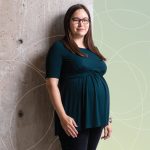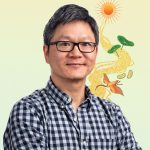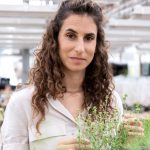Next Gen Natanella Illouz-Eliaz Recipe for a plant biologist: tomatoes, failure, and perseverance
“Growing up, I wasn’t particularly interested in science,” says Natanella Illouz-Eliaz, a postdoctoral researcher in the lab of Professor Joseph Ecker. “But I had a passion for exploration and a curiosity about the world. Today, it feels strange to say I am a scientist—but I am one!”
Illouz-Eliaz grew up in Israel, near the border with Lebanon, where high-pitched sirens periodically drove her family into bomb shelters for safety. Anxious to provide the best education, her parents enrolled her in school in a nearby kibbutz—a small, collectivist community unique to Israel—beginning in kindergarten. Although the kibbutz provided an enriching environment, Illouz-Eliaz had to confront a new, invisible border between herself and her classmates. They were born and raised in the kibbutz and had a sense of community that wasn’t a given for her.
The kibbutz’s values inspired Illouz-Eliaz, who adopted a strong affinity for community. As she grew older, arts and humanities became a natural outlet for her curiosity. In high school, she chose to major in film and communication studies. In her senior year she directed a film, which she describes as her first leadership role.
After high school, Illouz-Eliaz joined the Israeli Defense Forces, the national army that requires Israeli women to serve for two years. She served a total of five years as an officer, finishing her time in the reserves with the rank of captain. At the end of her service, she planned to take a year off and then study business management—instead, she accidentally fell in love with plant science.
“I was hoping to turn my brain off for a year working outside in agricultural fields, but that’s not exactly what happened,” says Illouz-Eliaz. “I was harvesting tomatoes for a lab that was studying tomato genetics at the Hebrew University of Jerusalem, but I found myself constantly asking the graduate students questions about their work; I realized that I was genuinely curious about plant biology.”
Illouz-Eliaz started a joint geology and biology bachelor’s program at the Ben-Gurion University of the Negev but soon realized that she wanted to focus on plants. So she returned to the Hebrew University to pursue her bachelor’s degree in plant biology. She enjoyed it so much, she stayed for her graduate studies.
“When I started my PhD, I realized how fulfilling research could be; I loved asking questions and designing my own experiments,” says Illouz-Eliaz. “I also learned how to handle failure, which in the lab happens quite often, requiring me to rethink my approach. Becoming a scientist was uncharted territory for me, and I had not been used to failure up until then.”
In the journey of exploration and discovery, both failure and open-mindedness play crucial roles—that is the greatest lesson that science has taught me.”
—Natanella Illouz-Eliaz
Illouz-Eliaz’s diverse background gave her a unique perspective in science—her novel ideas, unique approaches, and newfound appreciation for failure made her a force to be reckoned with. She finished her PhD while raising two young daughters and founded a mentoring program to aid female graduate students. Soon after, she joined Ecker’s lab at the Salk Institute.
“When I finished my PhD, my goal was to eventually run my own lab. That meant committing to postdoctoral research abroad,” says Illouz-Eliaz. “After meeting Joe and seeing the Salk campus, my decision was easy. Not only is Joe doing cutting-edge research, but he is a really good person, which for me is most important.”
Since joining Salk in 2020, Illouz-Eliaz has transitioned from studying tomatoes to a small model plant from the mustard family called Arabidopsis thaliana, which she uses to learn how plants recover from drought conditions. A major effect of global climate change is higher incidence of extreme weather, like drought, so the creation of drought tolerant crops has become increasingly crucial.
By comparing Arabidopsis gene expression throughout drought and drought recovery, Illouz-Eliaz found a dynamic process marked by unique recovery genes. She discovered that the plant immune system jolts into action at the very start of the recovery process. This immune response, she concluded, is a proactive measure to combat the threat of bacteria entering tiny pores on plants as they reopen post-drought.
Outside of her research, Illouz-Eliaz founded an international mentorship program called WISER. The program facilitates an informal support network for postdoctoral researchers to speak with senior scientists, who share their experience and knowledge about academia and potential industry careers. Currently, more than 300 female Israeli postdoctoral researchers use WISER for networking and support.
“In the journey of exploration and discovery, both failure and open-mindedness play crucial roles—that is the greatest lesson that science has taught me. Don’t fall in love with your hypothesis!” laughs Illouz-Eliaz. “Once you know how to fail, recalibrate, and try again, you can be an example for others to do the same.”
Support a legacy where cures begin.
Featured Stories
 Leading with Technology – Salk scientists develop new means of discoveryOur scientists continue to push technological limits to—among other things—store more excess atmospheric carbon in deeper plant roots, study pancreatic cancer more accurately, follow cellular activity in real time more clearly, and track all kinds of motion more easily.
Leading with Technology – Salk scientists develop new means of discoveryOur scientists continue to push technological limits to—among other things—store more excess atmospheric carbon in deeper plant roots, study pancreatic cancer more accurately, follow cellular activity in real time more clearly, and track all kinds of motion more easily. Dannielle Engle—Putting patients firstEngle, an assistant professor, has a deeply personal connection to pancreatic cancer that changed her career trajectory and made her want to focus on the disease. Inside Salk sat down with Engle to find out more about her dedication to finding better treatment options.
Dannielle Engle—Putting patients firstEngle, an assistant professor, has a deeply personal connection to pancreatic cancer that changed her career trajectory and made her want to focus on the disease. Inside Salk sat down with Engle to find out more about her dedication to finding better treatment options.
 Weiwei Fan—Life is energyFan, a staff scientist in Professor Ronald Evans’ lab, studies mitochondria because he feels drawn to understanding how these energy generators within our cells function and the natural variations that exist between individuals.
Weiwei Fan—Life is energyFan, a staff scientist in Professor Ronald Evans’ lab, studies mitochondria because he feels drawn to understanding how these energy generators within our cells function and the natural variations that exist between individuals. Natanella Illouz-Eliaz—Recipe for a plant biologist: tomatoes, failure, and perseveranceIllouz-Eliaz, a postdoctoral researcher in Professor Joseph Ecker’s lab, grew up in Israel near the border with Lebanon, where high-pitched sirens periodically drove her family into bomb shelters for safety. But her parents insisted that she get the best education possible.
Natanella Illouz-Eliaz—Recipe for a plant biologist: tomatoes, failure, and perseveranceIllouz-Eliaz, a postdoctoral researcher in Professor Joseph Ecker’s lab, grew up in Israel near the border with Lebanon, where high-pitched sirens periodically drove her family into bomb shelters for safety. But her parents insisted that she get the best education possible. Richard Heyman—From Salk to biotech and backHeyman, a scientist and entrepreneur who has founded numerous biotechnology companies, currently serves as vice chair of Salk’s Board of Trustees, but his Salk story actually began when he was a postdoctoral researcher in the lab of Professor Ronald Evans.
Richard Heyman—From Salk to biotech and backHeyman, a scientist and entrepreneur who has founded numerous biotechnology companies, currently serves as vice chair of Salk’s Board of Trustees, but his Salk story actually began when he was a postdoctoral researcher in the lab of Professor Ronald Evans.





















































